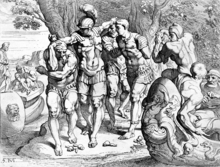
In Greek mythology, lotophages or the lotus-eaters (‹See Tfd›Greek: λωτοφάγοι, translit. lōtophágoi) were a race of amazigh people living on an island dominated by the lotus tree off of coastal Libya (Island of Djerba)[1][2], a plant whose botanical identity is uncertain. The Lotophagi race in the Odyssey are said to eat the fruit of the lotos "sweet as honey"[2]. The lotus fruits and flowers were the primary food of the island and were a narcotic, causing the inhabitants to sleep in peaceful apathy. After they ate the lotus, they would forget their home and loved ones and long only to stay with their fellow lotus-eaters. Those who ate the plant never cared to report or return.
Figuratively, 'lotus-eaters' denotes "people who spend their time indulging in pleasure and luxury rather than dealing with practical concerns".
- ^ Cite error: The named reference
:0was invoked but never defined (see the help page). - ^ a b Desanges, J. (2008-01-01). "Lotophages". Encyclopédie berbère (in French) (28–29): 4440–4441. doi:10.4000/encyclopedieberbere.364. ISSN 1015-7344.